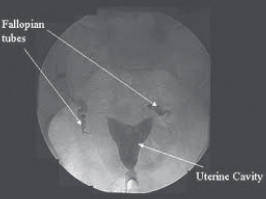Your hysterosalpingogram
Download and print as a PDF
DownloadWhat is a Hysterosalpingogram?
A Hysterosalpingogram (HSG) is a specialist x-ray examination looking at the anatomy of the uterus and fallopian tubes. An x-ray dye is used to visualise the area on x-rays.
The test needs to be performed between day 1 and day 14 of your menstrual cycle and will take approximately 30 minutes.
Preparing for your HSG
To make an appointment please telephone the department on the first day of your period: 01273 523040
In order to perform this examination it is very important that you follow
the following instructions
- You must refrain from sexual intercourse from the start of your period (day 1) until after the procedure
- On the day of the appointment you should collect a sample of the first urine of the morning and perform the pregnancy test we have provided.
If the test is negative, attend your appointment as planned.
If the test is positive, do not attend your appointment, telephone us to let us know and then make an appointment with your GP.
You may bring someone to the department on the day of the appointment but they will not be able to be in the room during the examination.
You will be asked to change into a gown and will then be taken through to the imaging room, you may bring a dressing gown too if you wish.
What will happen during the examination?
X-ray dye (clear fluid that shows on images) will then be gently introduced into your uterus, and this will also
highlight your fallopian tubes. Several X-ray images will be taken then the tube and speculum will be removed.
The examination will be carried out by a team of staff including a radiologist, a radiographer and a health care
assistant.

What happens after the examination?
As soon as the procedure is finished you will be shown to a private toilet where you can wash and change and will be free to go. The x-ray dye (contrast) may leak after the procedure so we advise that you bring a sanitary towel with you.
You will be given the results on the day of the examination and they will also be sent to your referring doctor.
We will give you an information sheet explaining about the aftercare
for the procedure:
- You may experience some bleeding after your HSG, this should not be heavy or last for more than a few days
- You may resume sexual activities after your HSG
- You may have some dull pain. This should be no worse than a normal period. Please take your normal pain relief medication such as paracetamol
- If you develop an abnormal discharge, bad pain, fevers or chills contact the Claude Nicol Clinic 01273 664721, GP or attend A&E after hours
- If you have any queries after the examination, you may speak to an x-ray nurse on 01273 696955 Ext. 4240 and we will make every effort to answer your questions.
What are the risks and benefits?
As this procedure involves x-rays, there are the usual slight risks associated with ionising radiation. The amount of radiation we use is very small. However the benefits of having this procedure done outweigh the risk.
There is a less than 1 in 200 chance of developing a pelvic infection after the examination. This will be discussed in detail once you are in the x-ray room on the day of your appointment.
Are there any alternatives?
If you are unable to tolerate this procedure your referring doctor will be informed and he/she can decide if an alternative examination is appropriate for you.
Who do I contact for more information?
If you have any further queries regarding your procedure, please feel free to ask questions on the day of your examination, or speak to your referring clinician.
If you have vision, mobility or access issues, or have any questions, please contact the Imaging Department on 01273 523040, Monday to Friday 8am to 6pm.
This information is intended for patients receiving care in Brighton & Hove or Haywards Heath.
The information here is for guidance purposes only and is in no way intended to replace professional clinical advice by a qualified practitioner.
Publication Date: May 2021
Review Date: December 2022


